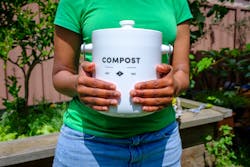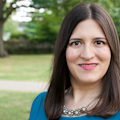I suppose you could say the idea had been brewing for a while, but the kettle finally started to boil last spring. Now, I’m steeped with excitement for a newfound passion.
Our habits and buying behaviors quickly changed in response to the pandemic. That has led to more conversations about substitutions for hard-to-find items, ways to make food last longer and more environmentally friendly food choices.
The contents of my own garbage can had weighed on me for months, but I hadn’t bothered to do anything about it. Supply chain issues and a desire to avoid unnecessary outings brought on by a global pandemic changed how I bought food. Getting laid off in 2020 changed how I consumed food. Both resulted in less food waste.
I have several vegetarian and vegan friends, so I know how delicious food can still be without meat or dairy. If you’re unemployed, eating less meat can also help stretch your food budget. I’ve experimented with more vegetables, legumes, grains and other plant-based protein sources this past year. That has fueled my creativity in the kitchen while also keeping my cholesterol in check.
I was settling into a new grocery routine, and then—wonder of wonders—my landlords opted into a local composting program. I knew a bit about composting from friends who garden but since I don’t have any outdoor plants, I didn’t feel compelled to bother with worms and soil pH levels. I am, however, more than happy to save my food scraps and let someone else take care of the rest.
It’s so incredibly easy. Whenever my compost bucket gets full or extra smelly, I take a 10-minute walk (or 4-minute drive) to the compost collection site. I empty the contents into a container that looks just like a residential garbage toter. That’s it. When I get home, I wash out my compost bucket, let it dry and start collecting again.
I have a printout of all the foods and other organic materials I can compost on my fridge, right next to a mailer from my city about what I can and cannot recycle. It’s a small thing, but it’s had a big impact on helping me get through the past year. And it’s spurred additional changes to be more sustainable.
In the past year, two refill shops have opened near me, and several other businesses have increased their selections of bulk goods and sustainable wares. Through them, I am learning more about single-use plastics and starting to buy more environmentally friendly alternatives.
These refill shops have started collections for hard-to-recycle plastics. They work with TerraCycle to recycle shampoo bottles, empty toothpaste containers, BRITA water filters, dry erase markers and more. The refill shops also work with nonprofits, including Danielle Cares for Chairs, which recycles bread tags to make wheelchairs, and Homeless Hookup CLE, which distributes sanitized plastic utensils to people in Cleveland without a permanent residence.
In March, a local chapter of Lions Club International entered the Trex recycling challenge. They’re collecting plastic films such as bubble wrap, dry cleaning bags, produce bags, newspaper sleeves, food storage bags, cereal box liners, plastic mailer bags, grocery bags and more. If they can collect at least 500 pounds of plastic in six months, Trex will donate a park bench made from these recycled plastics. I have dutifully started collecting.
I feel a bit like a hoarder, but I also feel like a superhero. I’m donating plastic bags and banana peels that I have no use or need for. What’s more, I’m helping to divert plastic and other organic matter from landfills that trap methane and contribute to greenhouse gas emissions. I’m literally saving the planet, one piece of trash at a time. And if gardeners have more fertile soil and community members have a place to sit in the park, that’s even better.
The best part about this whole process is that it’s free and only requires my time. There are plenty of resources and ways to get started in your own community. For example, TerraCycle and Nordstrom have recently partnered to create a national program to recycle all brands of beauty and skin care product packaging. I keep telling myself the goal is progress, not perfection. There’s always room for improvement and new programs or uses for our discards and leftovers.
After months of being told to stay home for my own safety, it’s empowering to do something within my own four walls that can help create a safer planet for years to come. And I’m just getting started.
About the Author
Nicole Stempak
Nicole Stempak is managing editor of EHS Today and conference content manager of the Safety Leadership Conference.

